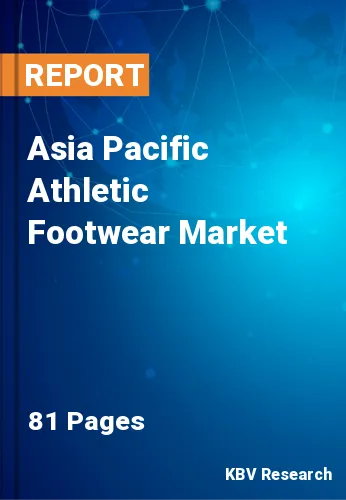The Asia Pacific Athletic Footwear Market would witness market growth of 5.3% CAGR during the forecast period (2022-2028).
The athletic footwear industry's expansion is being stifled by growing environmental concerns. The government's and environmental groups' proactive initiatives to combat pollution function as a market restraint. The industry is one of the primary sources of pollution in rivers and the environment. Puma, along with other sportswear brands such as Nike and Adidas, was dubbed "Dirty Laundry" in a report by the environmental organization Greenpeace. According to the research, Puma collaborated with Chinese suppliers who contributed to the contamination of the Yangtze and Pearl rivers.
The rise of the sports sector and industries that rely on it is aided by a shift in the educational paradigm. Furthermore, a surge in sports education and sports training in academics has resulted in a large increase in public awareness of sports and fitness. As a result, many schools and educational institutions provide students with training and opportunities to compete in different sports tournaments. Moreover, the expansion of the athletic footwear market is fuelled by a busy and hectic lifestyle, as well as an increasing number of consumers selecting outdoor activities like adventure sports to unwind or break the monotony of their everyday lives. Also, government initiatives in countries such as India and Australia to encourage sports, health, and fitness have resulted in greater awareness of sports and sports-related products like sports shoes, running & walking shoes, and tracksuits, which promotes market growth.
The key trends of the regional market are the large population base and lower average selling price of sports footwear when compared to established economies like the United Kingdom and the United States. Moreover, factors like high citizens' interest in sports, fitness, and adventure activities like aerobics, hiking, training, and trail running are acting as the growth catalysts for the regional market.
Rising consumer spending is backed by robust economic growth and more disposable income would impact the market in the region. According to data released by the World Bank, East Asia and the Pacific's GDP per capita income increased to 26.925 trillion in 2019, up from 26.351 trillion in 2018. Furthermore, the robust growth of numerous sports sectors, such as cricket, football, basketball, and others, would assist generate traction by encouraging more people to participate in sports as a hobby or a vocation. According to the Hindu Business Line, the brand value of India's main cricket competition, the Indian Premier League, increased by 7% in September 2019.
The China market dominated the Asia Pacific Athletic Footwear Market by Country in 2021, and would continue to be a dominant market till 2028; thereby, achieving a market value of $17,855.6 Million by 2028. The Japan market is anticipated to grow at a CAGR of 4.6% during (2022 - 2028). Additionally, The India market would showcase a CAGR of 5.9% during (2022 - 2028).
Based on Type, the market is segmented into Running Shoes, Trekking & Hiking Shoes, Sports Shoes, Walking Shoes, and Aerobic Shoes. Based on End User, the market is segmented into Men, Women, and Children. Based on countries, the market is segmented into China, Japan, India, South Korea, Singapore, Malaysia, and Rest of Asia Pacific.
Free Valuable Insights: The Worldwide Athletic Footwear Market is Projected to reach USD 171.9 Billion by 2028, at a CAGR of 4.7%
The market research report covers the analysis of key stake holders of the market. Key companies profiled in the report include Adidas AG, ASICS Corporation, FILA Holdings Corporation, Under Armour, Inc., Nike, Inc., PUMA SE, VF Corporation, Lotto Sport Italia Spa, and New Balance Athletics, Inc.
By Type
By End User
By Country
Our team of dedicated experts can provide you with attractive expansion opportunities for your business.

